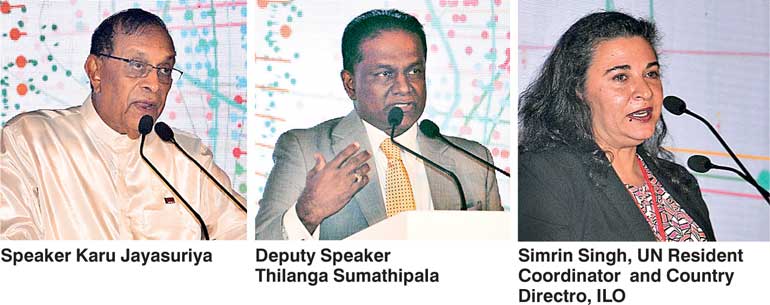Friday Feb 20, 2026
Friday Feb 20, 2026
Wednesday, 21 March 2018 01:19 - - {{hitsCtrl.values.hits}}
By Uditha Jayasinghe
Sri Lanka’s efforts to achieve Sustainable Development Goals (SDGs) should be centred on diverse types of data to provide clarity on policymaking, top officials said yesterday, calling on the Government and other stakeholders to focus on targets based on facts.

SDGs are far-reaching global goals to end poverty, protect the planet and ensure prosperity for all. Sri Lanka, along with 192 countries, committed to this ambitious agenda in 2015 by agreeing to achieve the 17 global goals.
The role of data in this agenda is often downplayed. Data is the lifeblood of decision-making, without which policymakers are unable to make informed, effective and evidence-based decisions that lead to achieving the SDGs.
On Tuesday, #SDGDataLK, Sri Lanka’s first National Symposium on Data for the SDGs, was inaugurated with the presence of Speaker Karu Jayasuriya, the Deputy Speaker of Parliament and Chairman of the Parliament Select Committee for the UN 2030 Agenda for Sustainable Development Thilanga Sumathipala, and the UN Resident Coordinator Simrin Singh.
The two-day symposium is a platform for enhancing the use of data towards evidence-based policymaking and coordination of monitoring the progress on the SDGs in Sri Lanka.
“For a country such as Sri Lanka, with established digital infrastructure, and 20.4 million people, gathering data should be more cohesive and forward-thinking. We should see how we can move away from the traditional methods to more technologically-advanced systems that can provide real-time data that can guide policymaking in the country,” Jayasuriya told the gathering.
Deputy Speaker Sumathipala acknowledged that Sri Lanka would have to increase its current data gathering measures exponentially to meet SDG goals. Currently the Census and Statistics Department does most of the data gathering but details of poverty, employment and other data are at times not diverse enough, he said.
“Overall in the Colombo District, unemployment is at 5.8% but there are pockets in the region where unemployment is as high as 28% but this is not adequately captured. Some of the data is gathered once a year or once every two years; our population census happens only once in 10 years so we need to increase the frequency of data gathering as well. It’s only then that we can get a clear picture of what we need to do,” Sumathipala added.
Highlighting the importance of data, UN Resident Coordinator a.i. Simrin Singh, said: ‘“Without data, we cannot know how many people are born and at what age they die; how many men, women and children still live in poverty; how many children need educating, and how many doctors to train.”
“We have been working for more than a year since November 2016 and we have managed to publish a Parliamentary Report on SDGs, as the first country in the world to do so, making an assessment of the SDGs and the impact it can have on the country. For any country to go forward in achieving the global goals, they need to have a plan to achieve those respective goals.”
Ten sessions will be conducted during the two days by 24 local and international resource persons. The sessions will discuss three main points: 1) Impact and Importance of Data; 2) Context and Challenges of SDG data in Sri Lanka, and 3) Strategy and Way Forward in using data for the SDGs.
The discussions will focus on the need for mapping baseline data in Sri Lanka, against the 244 SDG indicators, to understand where Sri Lanka currently stands in the journey towards achieving the SDGs by 2030.
Pix by Ruwan Walpola
